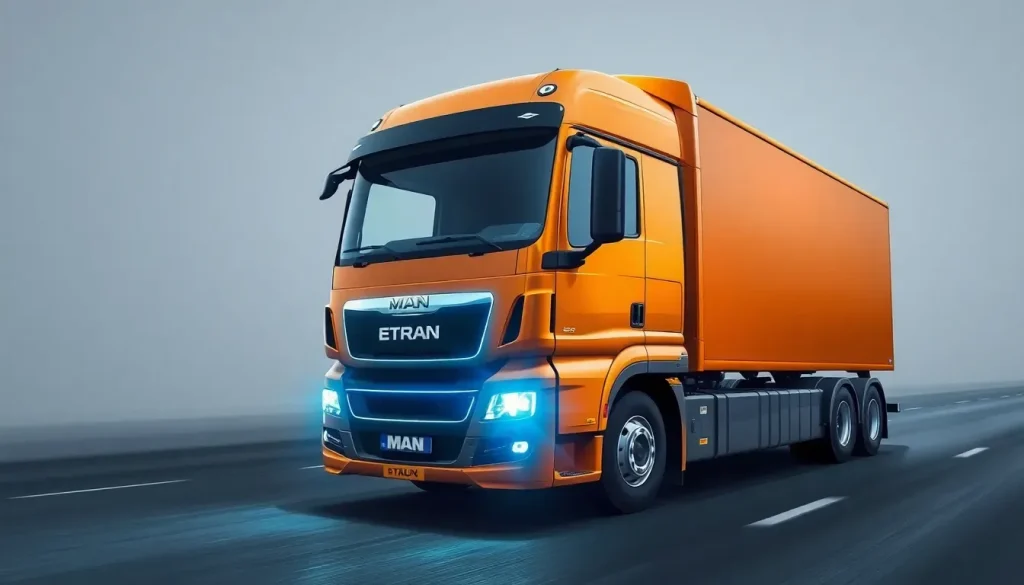MAN eTrucks exceed 5 million kilometers proving their reliability

As the world shifts towards sustainable transportation, the role of electric trucks becomes increasingly vital. MAN Truck & Bus has made impressive strides in this area, showcasing the reliability and efficiency of their electric models. With over five million kilometers traveled by their eTrucks, the evidence of their performance is compelling.
MAN eTrucks reach over 5 million kilometers: A testament to their reliability
Since early 2025, MAN's fully electric trucks have logged more than five million kilometers across the fleets of major European logistics operators such as DB Schenker, Dachser, Duvenbeck, and Dräxlmaier. This significant milestone not only highlights the practical applicability of these electric vehicles in various transport tasks but also underscores the potential for reducing carbon emissions in the logistics sector.
Approximately 200 electric battery trucks were made available to customers even before mass production commenced. Operating with 100% renewable electricity, these trucks average a consumption of 90 kWh per 100 km. The environmental impact is substantial, as they have saved around 3,600 tons of CO₂ compared to diesel trucks that consume approximately 27 liters per 100 km.
Assuming each of these eTrucks will cover 1.2 million kilometers over their lifetime, they could collectively save about 172,000 tons of CO₂ under similar conditions. To put this into perspective, this amount of CO₂ emissions is roughly equivalent to what a German city with about 32,000 inhabitants generates annually.
Start of mass production and rising demand
In June 2025, MAN commenced mass production of the eTGX and eTGS models, primarily designed for medium and long-distance transport, as well as for construction and municipal services. The innovative mixed assembly line, which produces both diesel and electric trucks, has the capacity to manufacture up to 100 vehicles daily, with a goal of surpassing 1,000 orders before the year's end.
Demand for these electric trucks has been exceptional. Shortly after starting mass production, MAN had already received nearly 800 orders for heavy electric trucks. Furthermore, in the first half of 2025, the company experienced a staggering 238% growth in this segment compared to the same period last year, albeit from a low initial base.
Growing adoption by logistics companies
The list of companies trusting MAN's electric trucks continues to expand. For instance, Behrens Group, one of Germany's leading wood wholesalers, has already logged over 50,000 km with its MAN eTGX trucks. These vehicles are equipped with interchangeable bodies for electric forklifts and can partially recharge using their own solar energy.
In France, Jacky Perrenot Group, one of Europe’s largest food transporters, has received the first vehicles from an order exceeding 100 eTrucks. In the Netherlands, logistics companies like Cornelissen, van Doorn, and Koopman are already utilizing electric trucks for urban and regional delivery services.
In Poland, Danone employs fully electric MAN trucks for food transportation, significantly reducing their carbon footprint in the supply chain. Meanwhile, in Portugal, TJA transport company is enhancing its fleet with electric trucks for national logistical tasks. Northern Europe is also seeing the benefits, with Nor Tekstil, Norway's largest textile service provider, utilizing their first MAN eTrucks.
In Denmark, Royal Unibrew, a beverage group, is relying on these trucks to ensure more sustainable deliveries to retailers. Furthermore, MAN is noticing a growing interest in electric trucks within the municipal sector, highlighted by a framework agreement signed by an Austrian association of twelve cities and municipalities for the acquisition of 45 electric vehicles.
Environmental impact and sustainability initiatives
The environmental implications of switching to electric trucks are profound. The reduction in carbon emissions not only contributes to cleaner air but also supports global efforts to combat climate change. As businesses increasingly face pressure to adopt sustainable practices, electric trucks represent a viable solution.
- Reduction in greenhouse gas emissions.
- Lower operational costs over the vehicle's lifespan.
- Enhanced public image for companies prioritizing sustainability.
- Compliance with increasingly stringent environmental regulations.
- Potential government incentives for electric vehicle adoption.
Future developments and innovations in electric trucking
As MAN continues to innovate, the future of electric trucking looks promising. The focus is on not only expanding the fleet of electric trucks but also improving their technology to enhance efficiency and reduce costs further.
Future initiatives may include:
- Development of faster charging solutions for electric trucks.
- Integration of advanced telematics for better route management.
- Enhanced battery technologies for longer ranges.
- Collaboration with renewable energy providers to ensure sustainable charging solutions.
Additionally, MAN is investing in research and development aimed at improving the overall performance of electric trucks. This includes exploring alternative energy sources and advanced battery technologies that could revolutionize the industry further.
For a closer look at the capabilities of the MAN TGX, check out this video:
In summary, MAN’s electric trucks are not merely a step forward in logistics but a leap towards a more sustainable future. As more companies recognize the benefits of electric transportation, the industry is poised for a significant transformation, paving the way for greener logistics operations worldwide.




Leave a Reply